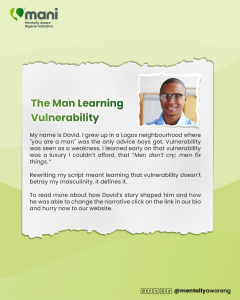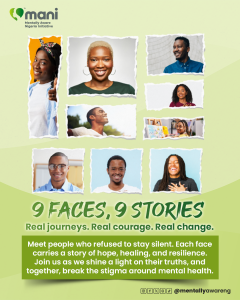
My name is David. I grew up in a Lagos neighbourhood where “you are a man” was the only advice boys got. Vulnerability was seen as a weakness. So, I learned to smile through pain, bury my feelings, and stay silent. From the moment I could walk, I heard my father telling me to “man up” whenever I hesitated at life’s smaller bumps. In secondary school, my grades slipped and the taunts came harder, so I kept my mouth shut rather than risk being seen as weak. At university, the weight of academic expectations, financial stress, and the constant pressure to appear confident built a silent tension inside me. I learned early on that vulnerability was a luxury I couldn’t afford, that “Men don’t cry; men fix things.”
After graduation, I landed a steady job at an advertising agency. Outwardly, I was successful and respected by colleagues, able to rent a flat in Lekki, and invited to weekend outings where I laughed and appeared unbothered. Inside, however, I felt trapped by expectations. When a major pitch failed and my relationship unravelled, I retreated deeper into myself, putting in longer hours at the office, running miles alone at midnight, and stifling the panic that gripped my chest each morning. Every time I considered opening up to my friends, the echo of “man up” played in my head. So instead, I swallowed my pain.
One evening, as I scrolled through social media, I saw a post from a childhood friend, talking about how reaching out doesn’t make someone any less strong. Something shifted in my chest. The next day, I mustered the courage to send a message: “I need to talk.” She didn’t judge. Instead, she offered a safe space to listen. That first conversation felt strange, like learning a new muscle but as I spoke, the pressure in my chest loosened. Over the following weeks, I connected with a counsellor who guided me through coping tools, encouraged me to write letters to my younger self, and helped me name the shame that had followed me for years.
Through each counselling session, I began to challenge the voice inside that equated strength with silence. I realized that sharing my fears, tears, and setbacks didn’t diminish my worth, it revealed my honesty. I confidently established clear boundaries at work, sought assistance from a trusted colleague when a campaign encountered challenges, and recognized my own limits when I felt overwhelmed. At home, I started texting my mother more often, telling her how I really felt instead of just sending the occasional “I’m fine.” I took the initiative to apologize to my younger brother for not asking about his school experience. Since then, we’ve made it a point to share snippets of our days, celebrating our victories and learning from our failures together.
Today, I’m part of a support group for other men where I share pieces of my story: how I once believed tears were forbidden, how I nearly sank under the weight of feeling everything alone. When the group sits in a circle, I still get butterflies before I speak, but I remember how reaching out saved me. I tell the men that strength isn’t stoicism; strength is the willingness to be seen in your full, imperfect humanity. Rewriting my script meant learning that vulnerability doesn’t betray my masculinity, it defines it. And every time I tell someone “I’m not okay,” I acknowledge and honour the little boy I once told to “man up.” Now, I show him the true path forward: one of courage rooted in honesty, hope, and the strength of community.

